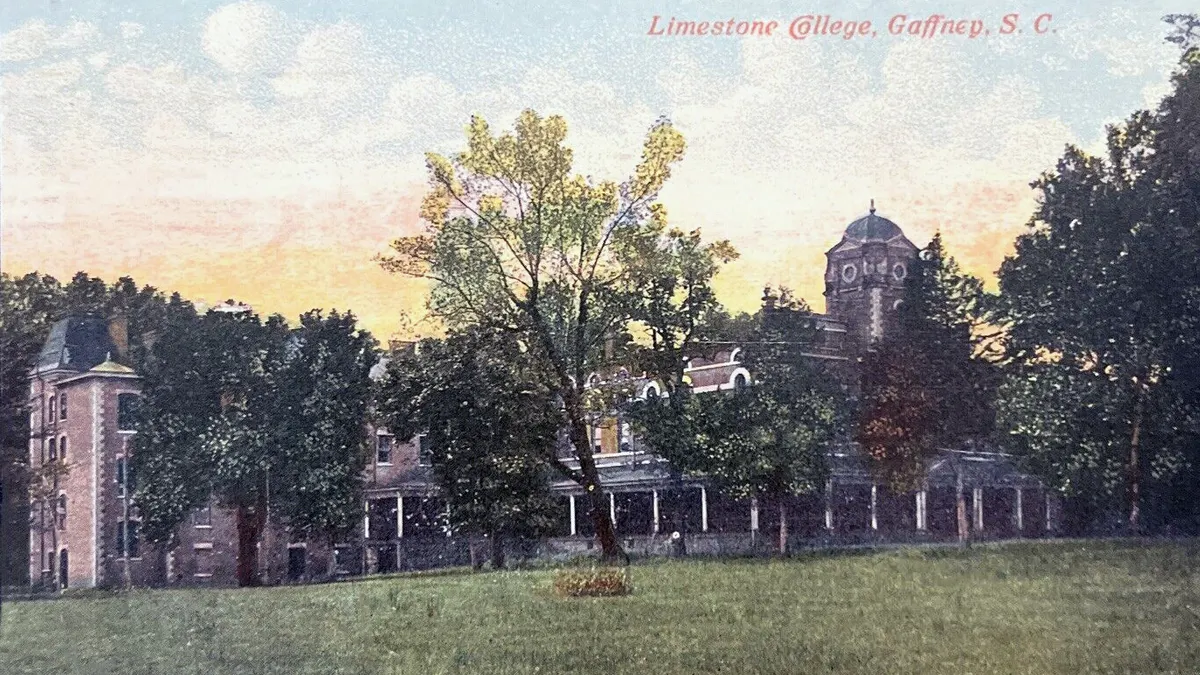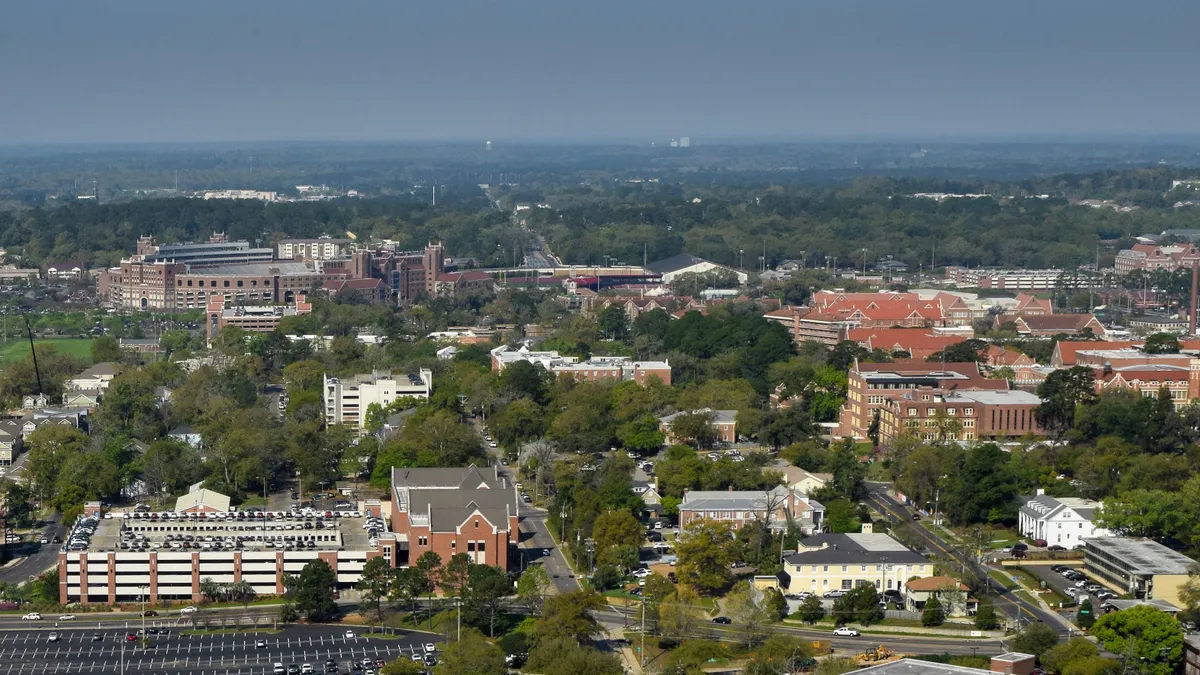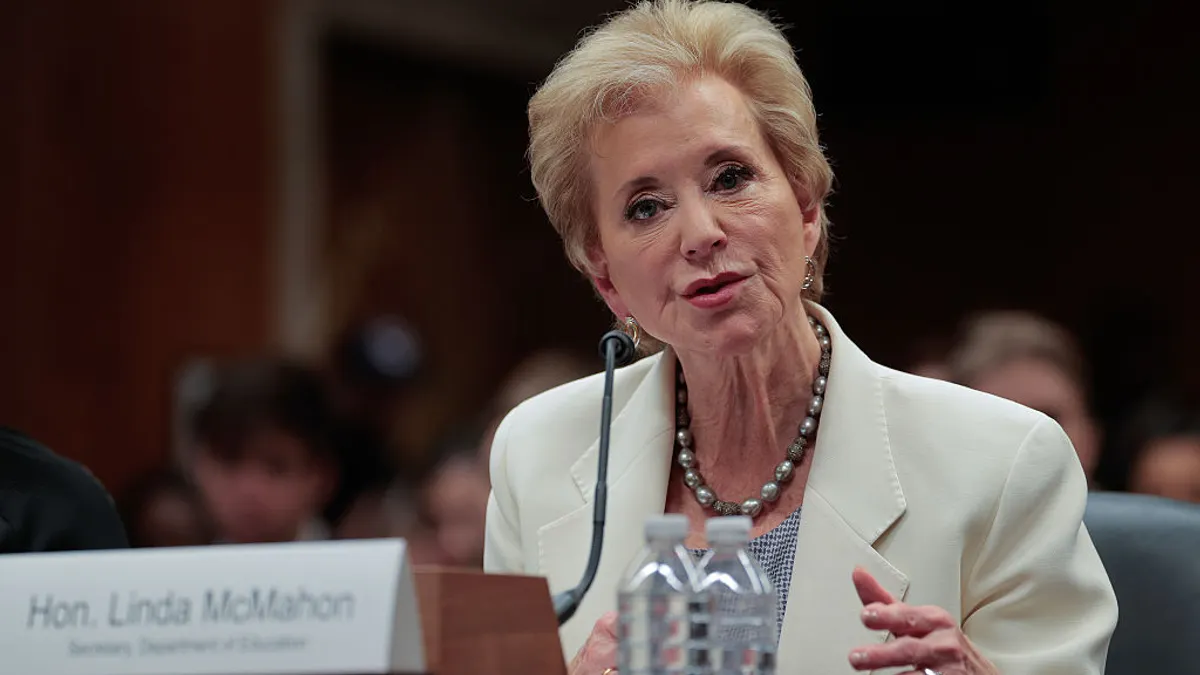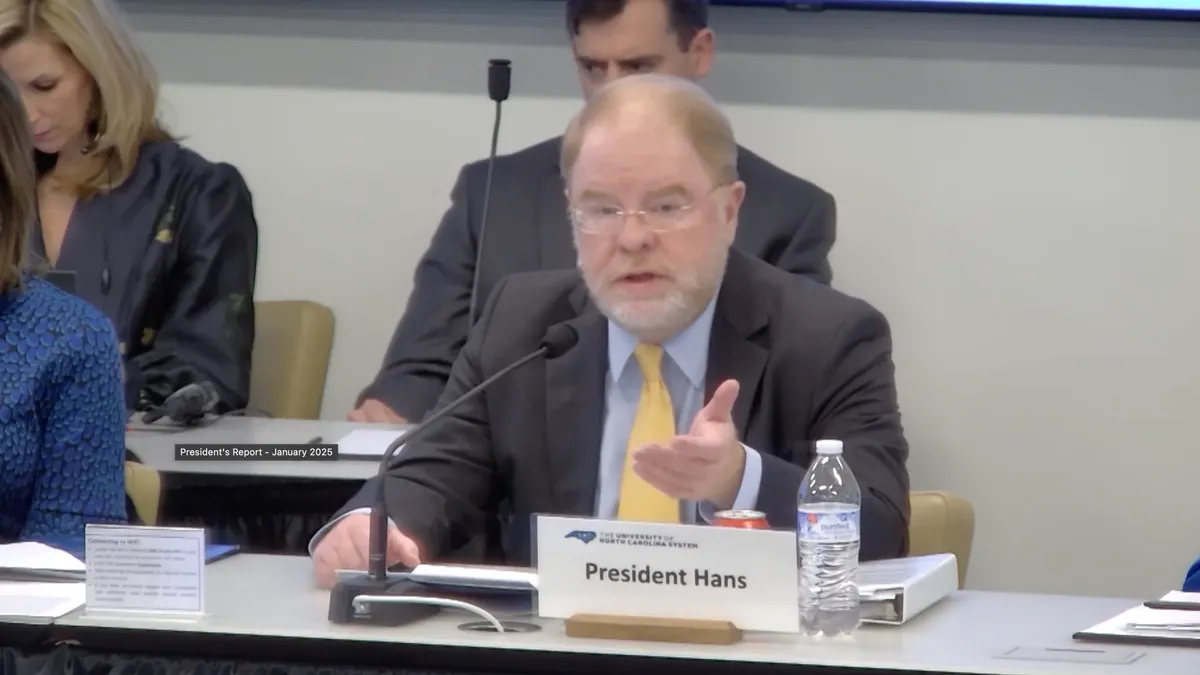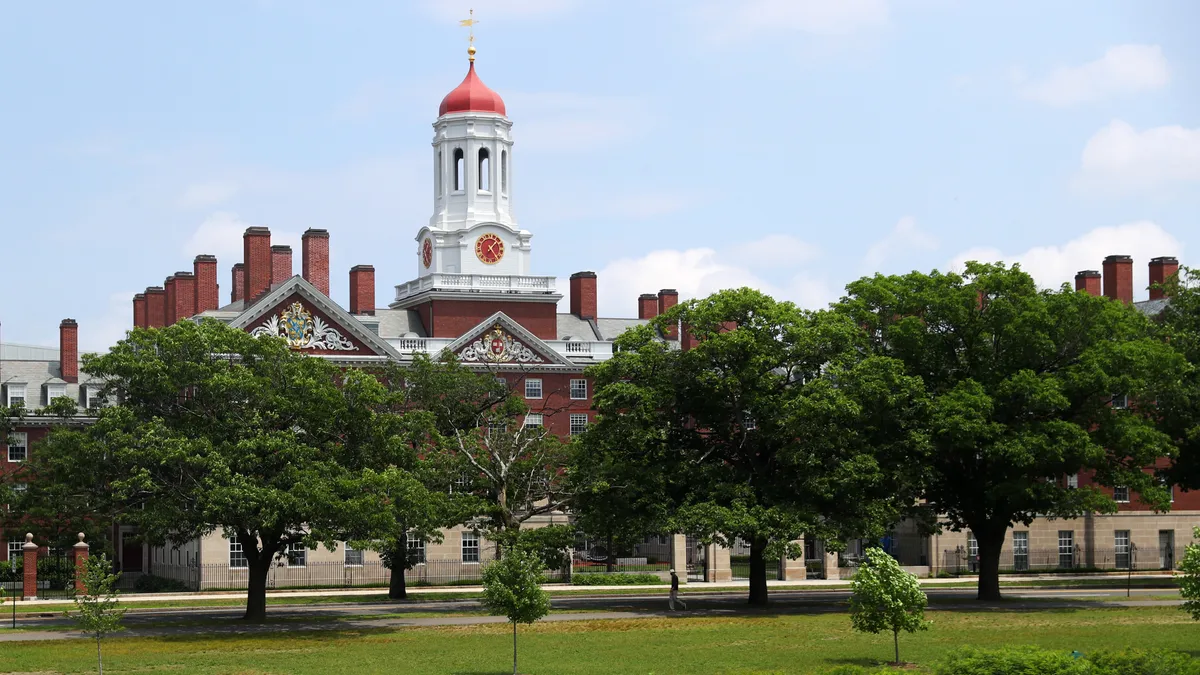In 2006, a group of private equity firms that included Goldman Sachs acquired the for-profit college operator Education Management Corp. (EDMC) in a $3.4 billion leveraged buyout.
By the fall of 2010, EDMC's student body had about doubled, before falling when new regulations barred tying recruiters' compensation to enrollment. Enrollment tumbled further over the following years, which also saw staff cuts and campus closures. In 2017, on the brink of bankruptcy, the company sold its college assets to Dream Center Education Holdings, a subsidiary of a faith-based nonprofit. That organization would collapse in less than two years.
EDMC is a stark case but is not alone in the history of private equity's investment in for-profit colleges. Buyouts spiked during the recession years, as students flocked to higher ed in the hope of making themselves more employable in a brutal job market. Acquisitions slowed as enrollment fell and the sector grappled with economics and more aggressive regulation. Even so, Wall Street left a lasting mark.
Private equity firms typically purchase companies with debt financing and look to sell them at a profit within several years, either to public markets or other private buyers. A paper released last year examining 88 such deals across nearly 1,000 colleges zeroed in on their impact on student outcomes and operations.
The findings cast a shadow over private equity's involvement in higher ed, with buyouts tied to less spent on education, higher tuition, more debt per student, lower graduation and repayment rates, and lower earnings for graduates.
Waves of buyouts
Mergers and acquisitions data on U.S. for-profit colleges provided by PitchBook and Acuris, and analyzed by Education Dive, shows the flow of private equity investment into the sector in recent years, as well as the key targets and players.
Buyouts of for-profit colleges largely follow the sector's own trajectory over the past 12 years. Deals hit a peak of 20 in 2009 following two consecutive years of 17 deals each, according to PitchBook data.
These were boom years at for-profits in terms of revenue and enrollment, as adults went back to school seeking new skills and credentials in the wake of the financial collapse. And the colleges were expanding rapidly to meet that demand — investments that would leave many with potentially catastrophic fixed costs when enrollment trends turned negative. (From 2010 to 2016, for-profit enrollment fell 47% from 1.7 million to 915,000 students after ballooning from 403,000 students in 2000, according to data from the National Center for Education Statistics.)
The flow of deals cratered in 2011, after enrollment peaked, before picking back up at a more modest level.
Those deals produced some hefty price tags. The largest since EDMC's takeover was the $3.8 billion buyout of Laureate Education in 2007 by an investor group that included private equity firms Kohlberg Kravis Roberts (KKR), Citi Private Equity and S.A.C. Capital Management as well as company executives.
Largest private equity acquisitions (2007-2019)
| College | Price | Private equity buyer | Year |
|---|---|---|---|
| Laureate Education | $3,800M | KKR, Citi, management, et al. | 2007 |
| Apollo Education Group | $1,140M | The Vistria Group | 2017 |
| University of St. Augustine for Health Sciences | $400M | Altas Partners | 2019 |
| ATI Career Training Center | $291.3M | BC Partners | 2009 |
| Star Career Academy | $43.6M | Gemini Investors | 2010 |
| EDIC College | $25.5M | Renovus | 2012 |
Source: PitchBook, Acuris, Education Dive
Niche investors move in
"The reality is, this was a phenomenon we are seeing the tail end of now," said Trace Urdan, managing director at education-focused investment bank and consulting firm Tyton Partners. "I don't think you're going to see private equity jump back into the sector anytime soon."
That mainly applies to the largest firms. "You do have some ... specialty private equity that are very, very smart about running schools and kind of make this a core part of their business," Urdan said. "Some of those guys are actually leaning in right now because they believe the economy is going to roll over at some point and demand is going to pick back up again. They're preparing themselves for that."
Among those that have made investments since 2015 are NCK Capital — which targets for-profit education companies along with health care, niche manufacturing and other specialties — as well as Sterling Partners and Altas Partners.
Joe D'Angelo, a partner with consulting and investment banking firm Carl Marks Advisors, thinks some of the bigger players involved in previous acquisition waves could return. "The old guard is back, there's some new interest," he said. "People are thinking this economy can't go on forever. And when we do have that recession, they're expecting a countercyclical upswing."
D'Angelo also thinks a Democratic presidential win in 2020 or changes in the 90-10 rule, which regulates the share of revenue for-profit colleges can draw from certain federal aid sources, could spook investors.
Higher ed is a specialty for private equity firms. D'Angelo compares the industry to health care, another highly regulated sector that has experienced similar waves of investment. "You don't see broad participation in investment in the education space, and I'm sure it's because of the regulatory nature (of the industry)," he said.
But some firms are clearly comfortable there. Since 2007, the most prolific private equity player in higher ed has been Sterling Partners, which has offices in Chicago and Baltimore.
The firm has made 12 for-profit college deals since 2007, according to PitchBook data. Those include GlobalHealth, Spartan College of Aeronautics and Technology, Tribeca Flashpoint Media Arts Academy and Ashworth College, according to Acuris and PitchBook data. (Ashworth settled with the Federal Trade Commission in 2015 over claims it made to students.)
Second most prolific is Leeds Equity Partners, one of the investors in the EDMC buyout and a former investor in Adtalem Global Education's Ross University.
The most prolific private equity buyers of for-profit colleges
| Private equity firm | Number of deals (2007-2019) |
|---|---|
| Sterling Partners | 12 |
| Leeds Equity Partners | 8 |
| Citigroup Alternative Investments | 5 |
| Southern Cross Group | 4 |
| CDPQ | 4 |
| Stockwell Capital | 4 |
| Vulcan Capital | 4 |
| Quad Partners | 4 |
| Snow Phipps Group | 4 |
| EduK Group | 4 |
| Apollo Global Management | 4 |
| TA Associates Management | 4 |
| Bregal Investments | 4 |
| The Wicks Group | 4 |
| Torreal | 4 |
| Makena Capital Management | 4 |
| Point72 Asset Management | 4 |
| Kohlberg Kravis Roberts | 4 |
Source: PitchBook
High profits, troubling outcomes
With billions of dollars pouring into for-profit colleges, private equity's track record of ownership has drawn scrutiny.
A 2012 Senate committee report led by Tom Harkin, who at the time was a Democratic senator from Iowa, noted that by 2009, 76% of students attending for-profits were enrolled at a college that was either publicly traded or private equity-owned. Private equity-owned schools alone accounted for 13% of for-profits' students, it noted. "[W]hile certainly not all for-profit colleges are run by investors looking to make a quick return on investment, too many of them are," the report's authors wrote.
An area in which those colleges do excel, however, is in capturing government aid, according to a paper out last year examining the impact of private equity deals on colleges.
One of its authors, Charlie Eaton, an assistant professor of sociology at the University of California, Merced, said in an interview that the sheer scale of private equity's effect on students' fates surprised him.
Eaton and his team found, for example, that private equity buyouts led to a six-percentage-point decline in graduation rates. Student loans per full-time, first-year borrower at private equity-owned schools were $1,745 more on average than at other for-profits and were more than double that of community college students. And at 32%, loan repayment rates for students at private-equity owned colleges were 9% lower than those of students at other for-profits and 15% lower than students at community colleges. On that metric, other for-profit colleges more closely resembled community colleges than they did their private equity-owned peers.
"A lot of times in social science, we find relationships that validate these theories, but it's like, 'Eh, well, that's going on but who cares? It's not that big of an effect,'" Eaton said. "But these are huge impacts."
In further research, he spoke with two former for-profit college executives who described to him how "private equity investors put pressure on them to maximize operating margins and maximize enrollment growth, and to not engage in things like better regulatory compliance" that could have prevented fraudulent behavior, he said.
"The old guard is back, there's some new interest. People are thinking this economy can't go on forever. And when we do have that recession, they're expecting a countercyclical upswing."

Joe D'Angelo
Partner, Carl Marks Advisors
In his view, the sector's investor-driven consolidation has exacerbated the negative effects of private equity's involvement. As Eaton noted and his paper described, other closely-held for-profit colleges often had comparatively good outcomes, especially those that are career-focused. But many of those programs have disappeared.
"One of the problems is, the private equity and publicly traded firms may have killed a lot of those schools, either by buying them up or by flooding the market with advertising in ways that pull students away from those higher-quality for-profits," Eaton said.
Urdan said private equity owners might be more "mercenary" about shutting down college systems abruptly in times of financial crisis. Education Corporation of America and Vatterott Educational Centers, to take two recent examples, were both private equity-owned when they shut down.
Bob Shireman, a senior fellow at The Century Foundation, a left-leaning think tank based in New York City, said it made sense for regulators to raise the level of scrutiny on buyers and owners of for-profit colleges — and on the incentive structures that may drive those operations. He noted not all private equity buyouts are the same, pointing to Laureate Education, which has gone through a buyout and multiple rounds of subsequent private equity investment without "a lot of evidence of predatory activity going on."
EDMC is a different story, Shireman said, adding that private equity did "what private equity is known for doing: going in there slashing costs and then selling out, and making some money doing so."



